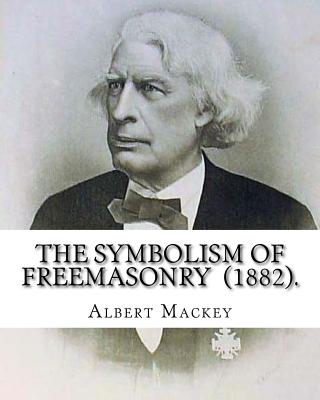The Symbolism of Freemasonry (1882). By: Albert Mackey: (World's classic's)

The Symbolism of Freemasonry (1882). By: Albert Mackey: (World's classic's)
Albert Gallatin Mackey (March 12, 1807 - June 20, 1881) was an American medical doctor and author. He is best known for his writing many books and articles about freemasonry, particularly the Masonic Landmarks. Biography: Grave of Albert Mackey at Glenwood Cemetery in Washington, D.C. Albert Gallatin Mackey was born in Charleston, South Carolina, the son of John Mackey (1765 - December 14, 1831), a physician, journalist and educator, and his wife. His father published The American Teacher's Assistant and Self-Instructor's Guide, containing all the Rules of Arithmetic properly Explained, etc. (Charleston, 1826), the most comprehensive work on arithmetic that had been published in the United States.His brother was Edmund William McGregor Mackey, later a member of the U.S. House of Representatives from South Carolina. After completing his early education, Albert Mackey taught school for some time to earn money for medical school. He graduated from the medical department of the College of South Carolina in 1832. He settled in Charleston, South Carolina. In 1838 he was appointed demonstrator of anatomy in that institution. In 1844 he abandoned the practice of medicine. For the rest of his life, he wrote on a variety of subjects, but specialized in the study of several languages, the Middle Ages, and Freemasonry. After being connected with several Charleston journals, he established in 1849 The Southern and Western Masonic Miscellany, a weekly magazine. He maintained it for three years, mostly by his own expense. He conducted a Quarterly 1858-1860 which he devoted to the same interests. He acquired the Greek, Latin, Hebrew, and continental languages almost unaided, and lectured frequently on the intellectual and moral development of the Middle Ages. Subsequently, he turned his attention exclusively to the investigation of abstruse symbolism, and to cabalistic and Talmudic researches. He served as Grand Lecturer and Grand Secretary of The Grand Lodge of South Carolina, as well as Secretary General of the Supreme Council of the Ancient and Accepted Scottish Rite for the Southern Jurisdiction of the United States. Mackey was a Union sympathizer during the Civil War and in July, 1865, President Andrew Johnson appointed him Collector of the Port of Charleston. He ran for the United States Senate in South Carolina in 1868, but was narrowly defeated by Republican Frederick A. Sawyer. Mackey moved to Washington, D.C. in 1870. He died in Fortress Monroe, Virginia in
PRP: 77.42 Lei
Acesta este Pretul Recomandat de Producator. Pretul de vanzare al produsului este afisat mai jos.
69.68Lei
69.68Lei
77.42 LeiLivrare in 2-4 saptamani
Descrierea produsului
Albert Gallatin Mackey (March 12, 1807 - June 20, 1881) was an American medical doctor and author. He is best known for his writing many books and articles about freemasonry, particularly the Masonic Landmarks. Biography: Grave of Albert Mackey at Glenwood Cemetery in Washington, D.C. Albert Gallatin Mackey was born in Charleston, South Carolina, the son of John Mackey (1765 - December 14, 1831), a physician, journalist and educator, and his wife. His father published The American Teacher's Assistant and Self-Instructor's Guide, containing all the Rules of Arithmetic properly Explained, etc. (Charleston, 1826), the most comprehensive work on arithmetic that had been published in the United States.His brother was Edmund William McGregor Mackey, later a member of the U.S. House of Representatives from South Carolina. After completing his early education, Albert Mackey taught school for some time to earn money for medical school. He graduated from the medical department of the College of South Carolina in 1832. He settled in Charleston, South Carolina. In 1838 he was appointed demonstrator of anatomy in that institution. In 1844 he abandoned the practice of medicine. For the rest of his life, he wrote on a variety of subjects, but specialized in the study of several languages, the Middle Ages, and Freemasonry. After being connected with several Charleston journals, he established in 1849 The Southern and Western Masonic Miscellany, a weekly magazine. He maintained it for three years, mostly by his own expense. He conducted a Quarterly 1858-1860 which he devoted to the same interests. He acquired the Greek, Latin, Hebrew, and continental languages almost unaided, and lectured frequently on the intellectual and moral development of the Middle Ages. Subsequently, he turned his attention exclusively to the investigation of abstruse symbolism, and to cabalistic and Talmudic researches. He served as Grand Lecturer and Grand Secretary of The Grand Lodge of South Carolina, as well as Secretary General of the Supreme Council of the Ancient and Accepted Scottish Rite for the Southern Jurisdiction of the United States. Mackey was a Union sympathizer during the Civil War and in July, 1865, President Andrew Johnson appointed him Collector of the Port of Charleston. He ran for the United States Senate in South Carolina in 1868, but was narrowly defeated by Republican Frederick A. Sawyer. Mackey moved to Washington, D.C. in 1870. He died in Fortress Monroe, Virginia in
Detaliile produsului









